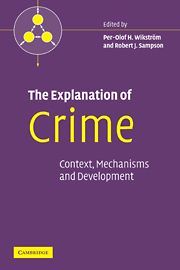Crossref Citations
This Book has been
cited by the following publications. This list is generated based on data provided by Crossref.
LEVI, MICHAEL
2007.
Fraud by A. Doig, Organised Crime by A. Wright and Confessions of a Dying Thief: Understanding Criminal Careers and Illegal Enterprise by D. Steffensmeier and J. Ulmer.
The Howard Journal of Criminal Justice,
Vol. 46,
Issue. 4,
p.
445.
Wikström, Per-Olof
2007.
International Handbook of Penology and Criminal Justice.
p.
345.
Oberwittler, Dietrich
2007.
The Effects of Neighbourhood Poverty on Adolescent Problem Behaviours: A Multi-level Analysis Differentiated by Gender and Ethnicity.
Housing Studies,
Vol. 22,
Issue. 5,
p.
781.
Hirschfield, Alex
2008.
The Multi-Faceted Nature of Crime.
Built Environment,
Vol. 34,
Issue. 1,
p.
5.
Bunge, Mario
2008.
Bayesianism: Science or Pseudoscience?.
International Review of Victimology,
Vol. 15,
Issue. 2,
p.
165.
ANTONACCIO, OLENA
and
TITTLE, CHARLES R.
2008.
MORALITY, SELF‐CONTROL, AND CRIME*.
Criminology,
Vol. 46,
Issue. 2,
p.
479.
MCGLOIN, JEAN MARIE
2009.
DELINQUENCY BALANCE: REVISITING PEER INFLUENCE*.
Criminology,
Vol. 47,
Issue. 2,
p.
439.
BRAUER, JONATHAN R.
2009.
TESTING SOCIAL LEARNING THEORY USING REINFORCEMENT'S RESIDUE: A MULTILEVEL ANALYSIS OF SELF‐REPORTED THEFT AND MARIJUANA USE IN THE NATIONAL YOUTH SURVEY*.
Criminology,
Vol. 47,
Issue. 3,
p.
929.
Wikström, Per‐Olof H.
2009.
Questions of perception and reality.
The British Journal of Sociology,
Vol. 60,
Issue. 1,
p.
59.
KIRK, DAVID S.
2009.
UNRAVELING THE CONTEXTUAL EFFECTS ON STUDENT SUSPENSION AND JUVENILE ARREST: THE INDEPENDENT AND INTERDEPENDENT INFLUENCES OF SCHOOL, NEIGHBORHOOD, AND FAMILY SOCIAL CONTROLS*.
Criminology,
Vol. 47,
Issue. 2,
p.
479.
Op de Beeck, Hanne
and
Pauwels, Lieven
2010.
“Do Unstructured Routines Modify the Link Between Social-Psychological Strain and Adolescent Offending?”.
European Journal on Criminal Policy and Research,
Vol. 16,
Issue. 4,
p.
221.
KRONEBERG, CLEMENS
HEINTZE, ISOLDE
and
MEHLKOP, GUIDO
2010.
THE INTERPLAY OF MORAL NORMS AND INSTRUMENTAL INCENTIVES IN CRIME CAUSATION*.
Criminology,
Vol. 48,
Issue. 1,
p.
259.
Wikström, Per-Olof H.
Ceccato, Vania
Hardie, Beth
and
Treiber, Kyle
2010.
Activity Fields and the Dynamics of Crime.
Journal of Quantitative Criminology,
Vol. 26,
Issue. 1,
p.
55.
Wikström, Per-Olof H.
2010.
Handbook of the Sociology of Morality.
p.
211.
Stummvoll, Günter P.
Kromer, Ingrid
and
Hager, Isabella
2010.
Juvenile Delinquency in Europe and Beyond.
p.
97.
Svensson, Robert
and
Pauwels, Lieven
2010.
Is a Risky Lifestyle Always “Risky”? The Interaction Between Individual Propensity and Lifestyle Risk in Adolescent Offending: A Test in Two Urban Samples.
Crime & Delinquency,
Vol. 56,
Issue. 4,
p.
608.
Laub, John H.
2010.
Nurturing the Journal of Quantitative Criminology Through Late Childhood: Retrospective Memories (Distorted?) from a Former Editor.
Journal of Quantitative Criminology,
Vol. 26,
Issue. 4,
p.
421.
Kirk, David S.
and
Laub, John H.
2010.
Neighborhood Change and Crime in the Modern Metropolis.
Crime and Justice,
Vol. 39,
Issue. 1,
p.
441.
Tittle, Charles R.
Botchkovar, Ekaterina V.
and
Antonaccio, Olena
2011.
Criminal Contemplation, National Context, and Deterrence.
Journal of Quantitative Criminology,
Vol. 27,
Issue. 2,
p.
225.
MCGLOIN, JEAN MARIE
SCHRECK, CHRISTOPHER J.
STEWART, ERIC A.
and
OUSEY, GRAHAM C.
2011.
PREDICTING THE VIOLENT OFFENDER:THE DISCRIMINANT VALIDITY OF THE SUBCULTURE OF VIOLENCE*.
Criminology,
Vol. 49,
Issue. 3,
p.
767.





